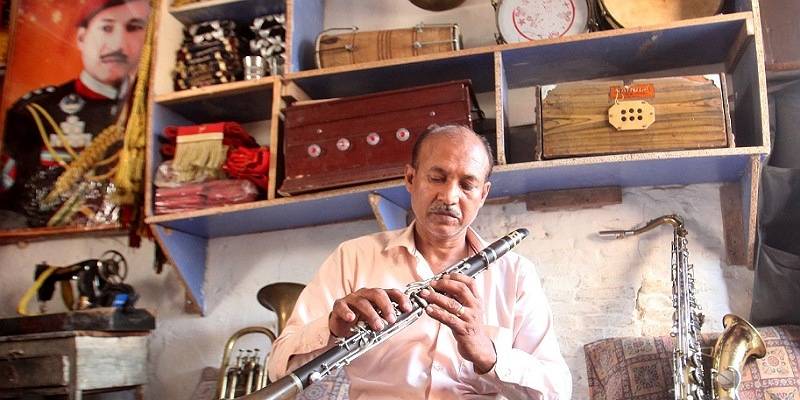
PESHAWAR: Once visiting fish market near Ghanta Ghar (Cunningham Clock Tower) time back, I noticed a really narrow stairway next to the fish shop I was standing by. A person carrying a water container went upstairs from there. So narrow was the staircase that it left me wondering where it would lead. When I saw above, it was an old structure (probably a residence) now serving as an office for a brass band as the billboard hanging there suggested.
The brass band, a musical ensemble generally consisting entirely of brass instruments, dates back to the early nineteenth century. Their live music is an important staple of wedding processions (baraat) here in South Asian countries. I still remember Bollywood’s 1984 flick “Sharabi” song “De De Pyaar De”, featuring Amitabh Bachchan as Vicky singing the hit number accompanying brass band group in front of his love Meena (Jaya Prada)’s apartment. Recalling my childhood, it was the live music by these bands which would inform guests at bride’s place of the arrival of baraat and 1984’s movie Boxer (starring Mithun Chakraborty and Rati Agnihotri) song “Shadmani o Shadmani” was and still is a favourite composition to play at weddings by these bands.
Other than these melodies, I also remember one of the musicians designated to collect the currency notes showered at weddings; often struggling with the guest children who tried to catch the notes and rummaged the floor to gather the same.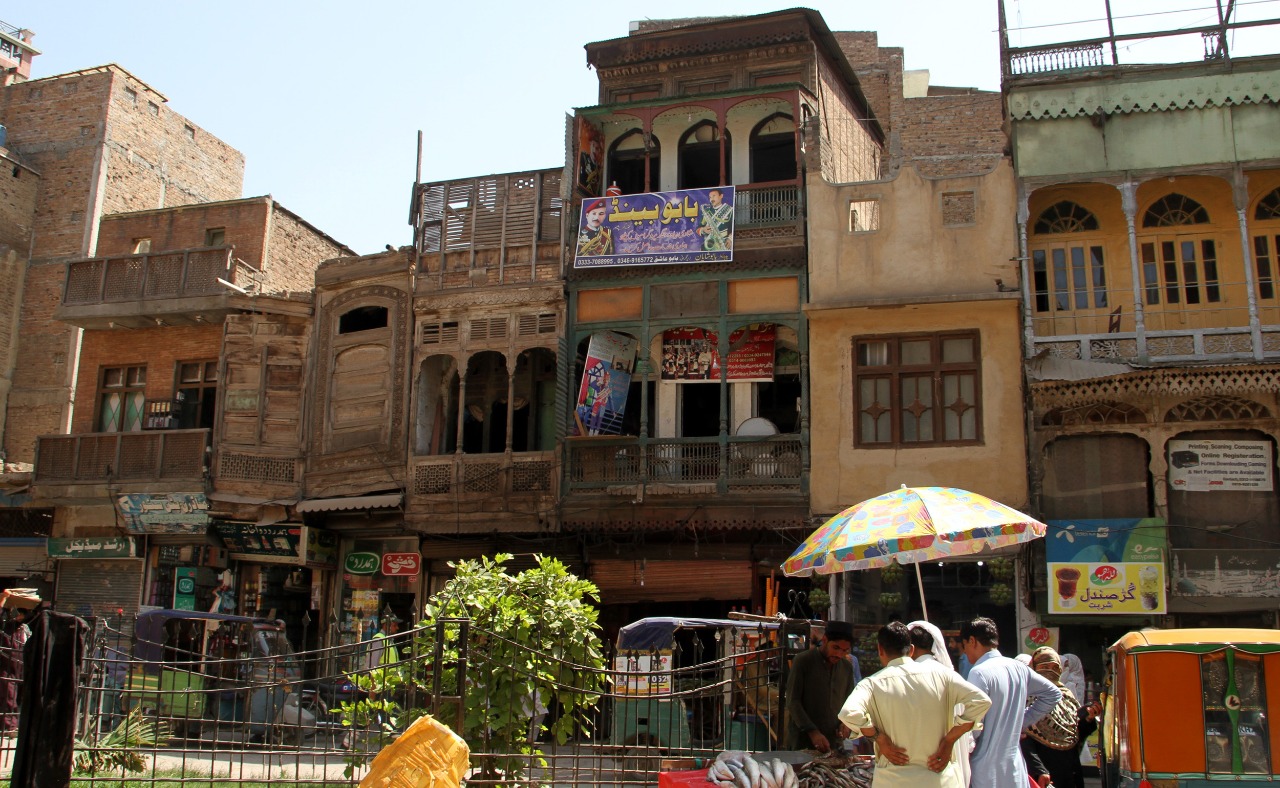
Built in 1900 in commemoration of the Diamond Jubilee of Queen Victoria, the Cunningham Clock Tower was named after Sir George Cunningham, a former British governor and political agent in the then North-West Frontier Province (now Khyber Pakhtunkhwa). From the eastern side of the historical Chowk Yadgar, lies the tower where Karimpura Bazar forks off from Bazar-e-Kalaan Road. The said road runs on the right side, ending up at Gor Khattri Archaeological Complex.
The next time when I visited Bazar-e-Kalaan, I noticed that so many brass band and pipe band offices existed there and nearby Ghanta Ghar Bazar. One common thing is that all of them are located on top floors of the narrow old buildings while the ground floors of these buildings host shops. Passing from there, you may notice the sound of musical instruments being played at a low pitch at some of these offices.
As post COVID-19 lockdowns and the ban on public gatherings have financially affected every segment of our society, what will the dhol (drum) players, DJs, and band players be doing for their sustenance? With this question on my mind, I wanted to visit a brass band. And as I mentioned earlier, there are so many such offices in Ghanta Ghar Bazar and Bazar-e-Kalaan like Khyber Pipe Band, Sialkot Band and others; Babu Band is one of the oldest ones among them.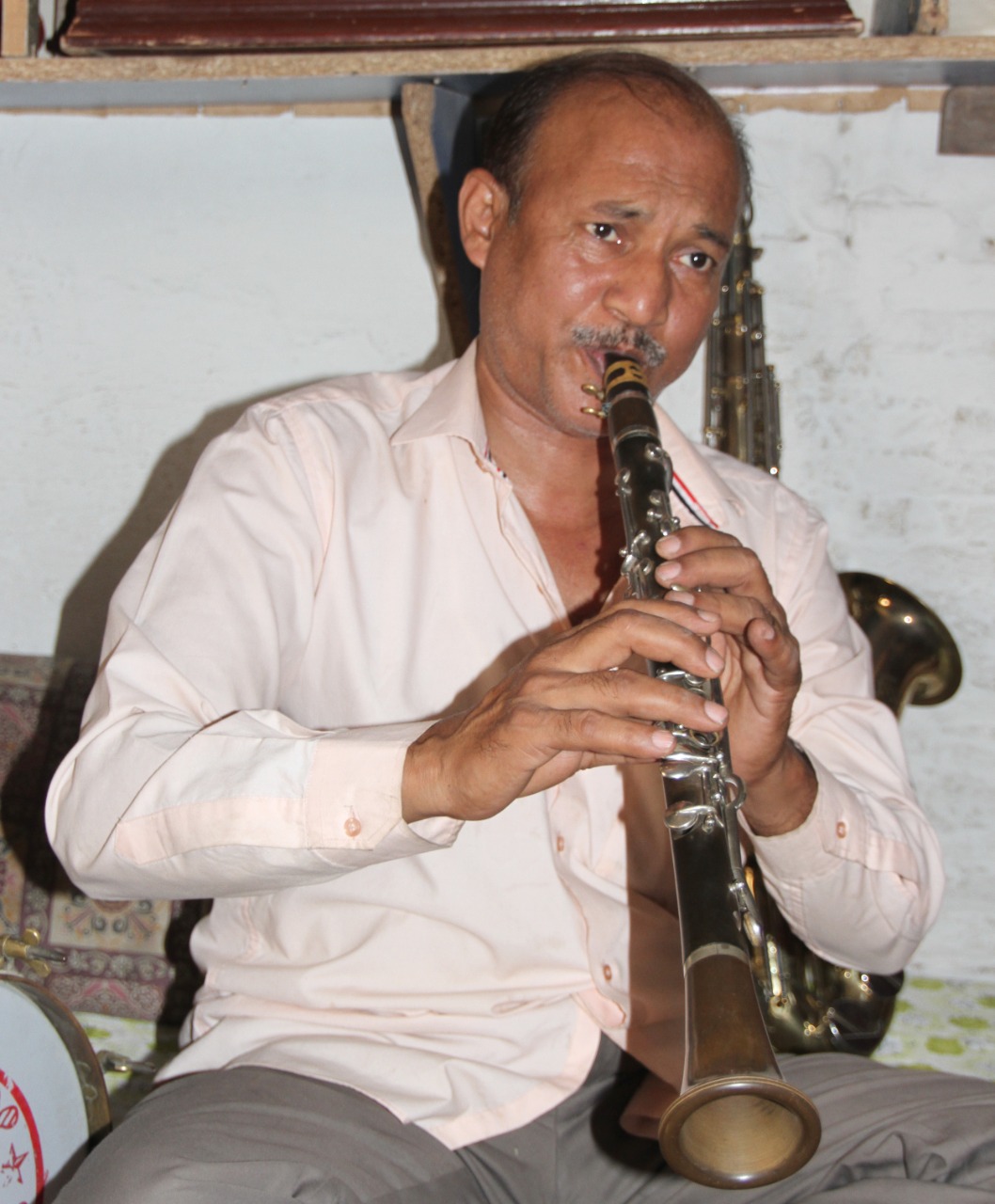
Passing through a fish shop (and you must have to bear the intense smell of fish), a narrow staircase leads to the first floor of the building. Then you have to climb another set of stairs as this is the second floor where Babu Band has rented a room as an office.
Bandmaster Babu Aashiq, son of Bandmaster Shingara, was busy repairing a clarinet while one of his sons was rehearsing harmonium at that moment. Aged 58, Babu Aashiq says that soon after completing his matriculation in 1983, he joined his father Bandmaster Shingara who had founded the Babu Band. “Although I continued my studies as well besides carrying on with my music education,” he added.
About the instruments of the brass band, he said that they play saxophone, trumpets, clarinet, and drums in the brass band. While those playing pipe bands have different type of instruments. He can play all of them but now he acts as a conductor giving instructions to other performers about their music notes.
About brass band musical instruments, he opines that the trumpet is the hardest one to learn and play. “In a sense that on a piano or harmonium, you have many keys while the trumpet has only three valves (buttons in common language) and you have to play so many notes with these three only,” he explains.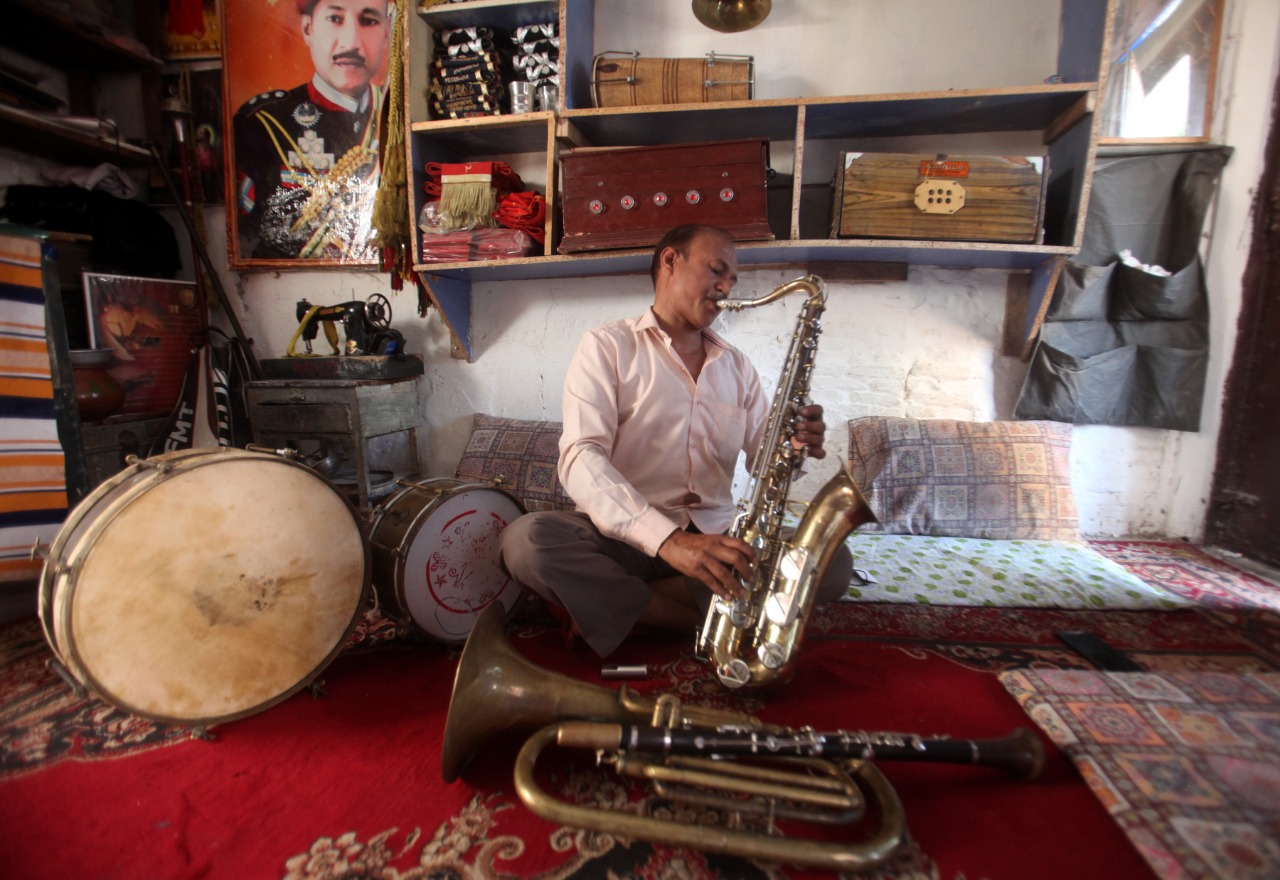
As performing for the last 38 years, when asked about the change in audiences’ music taste, he said that previously people had a flare for both lyrics and music and asked them to play Lata Mangeshkar, Muhammad Rafi, Madam Noor Jahan, and Ustad Mehdi Hassan’s classic numbers’ compositions. “Today’s audience would seldom ask you for their choice. Be it a Punjabi or Pashto tune, whichever you play for them, they are okay with it,” he smiles. "In general, our hosts treat us well. Although, they fulfill the hospitality tradition of their land and force us not to leave without having meals, but they should also think about our financial compulsions,” stresses the senior musician.
Their sets of uniform were piled up in a rack in his office. The temperature was above 40 degrees that day. Pointing to the uniforms, he said: “We dress up in these heavy uniforms. Other than that, playing wind (aerophone) instruments consumes much energy as it involves your lungs while also you have to do great effort to keep your mouth tight on the mouth organ. Those on wind instruments (saxophone or trumpets) can have a pause for a while after playing their notes, while the drummers have to keep beating their drums continuously without any break. That is also a rigorous job on their part. This makes us sweat heavily,” the bandmaster said while elaborating the conditions they face while performing in hot weather.
He added that most of the people associated with them are carrying it on as a part-time job as one cannot afford to support his family with this meager earning. “I repair musical instruments to make some extra money and most of my musicians also do other jobs to meet expenses,” he went on to say.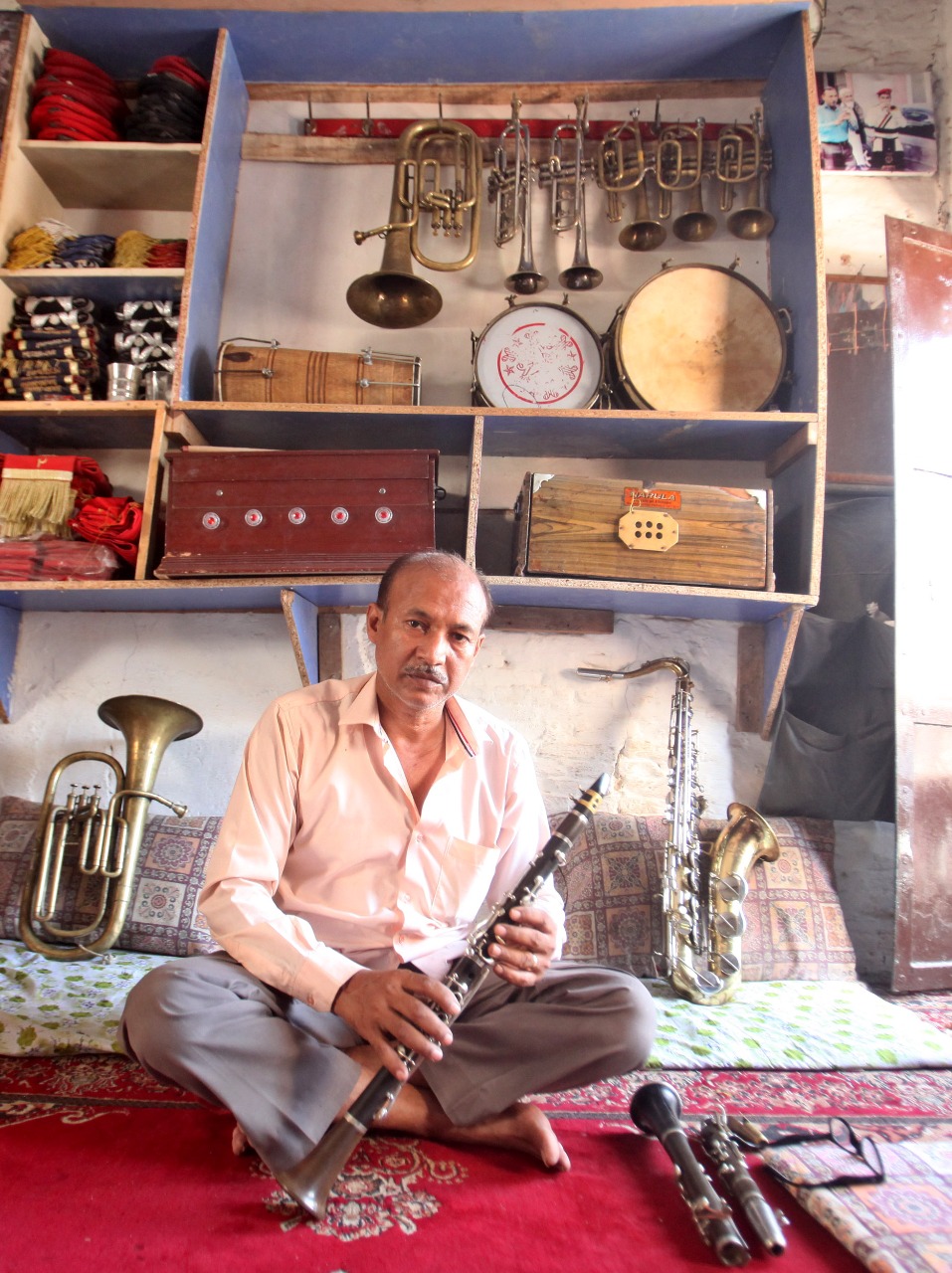
Babu Aashiq has three sons. Two are 11th graders and one is in 10th grade. His wife is a private school teacher. His sons also perform with him besides carrying on with their studies. “My other brother is not into the music field. I am the second generation in my family in this field and my children are the third one as I want them to continue with this field joined by their grandfather,” he says.
According to him, the situation is different in Punjab Province where brass bands have own associations and as the province is the biggest one in terms of population, they have more opportunities to perform and get paid more than their counterparts here in Khyber Pakhtunkhwa.
The bandmaster says proudly that other than his sons, he has imparted his music skills to so many other people hailing from different parts of the country while some of them are abroad now. Besides displaying musical instruments in his office, he has decorated it with band pictures performing at different places. Also among these pictures, there are the photographs of his teachers.
When asked didn’t he have any other work opportunity, he said that when you manage to get some work in an orchestra, they take long for rehearsals and then pay you late.
He said sorrowfully that after face-lifting of the bazar under the Cultural Heritage Project by the KP Archaeology Department, they are asked by the district administration to remove billboards as these are hiding the faces of the ancient buildings hosting brass band offices.
“I want to ask them that isn’t brass band a part of the culture. One of my music teachers, who passed away after reaching 100 years of age, used to say that brass band existed in this part of the subcontinent since times he remembered,” said the senior musician.
Babu Aashiq was really disheartened by the authorities’ negligence towards their financial problems in the wake of the COVID-19 scenario. “Nobody even asked us how we were doing when there were lockdowns off and on and weddings and other festive gatherings were either banned or limited. We have to pay rent and utility bills for our offices while back at home, we have to support our families as well,” he complained.
The room in front of the Babu Band office was rented by a music teacher Aasif Chishti. Chishti teaches music in part-time as he cannot afford to bear his living expenses doing it full time. He was resting in his room with his musical instruments accompanying him, instead of any student.
The government and organisations working for art and culture must come forward to patronize these people who perform to add colours to our happy occasions with their melodies.
From the balcony of the office, I had a view of the Ghanta Ghr. A pair of birds was sitting on the structure and flew up as soon as the clock struck 6 (pm). May be they were frightened by the sound. Around the base of the tower, some daily wage labourers were also sitting with their gears waiting for a job.
The brass band, a musical ensemble generally consisting entirely of brass instruments, dates back to the early nineteenth century. Their live music is an important staple of wedding processions (baraat) here in South Asian countries. I still remember Bollywood’s 1984 flick “Sharabi” song “De De Pyaar De”, featuring Amitabh Bachchan as Vicky singing the hit number accompanying brass band group in front of his love Meena (Jaya Prada)’s apartment. Recalling my childhood, it was the live music by these bands which would inform guests at bride’s place of the arrival of baraat and 1984’s movie Boxer (starring Mithun Chakraborty and Rati Agnihotri) song “Shadmani o Shadmani” was and still is a favourite composition to play at weddings by these bands.
Other than these melodies, I also remember one of the musicians designated to collect the currency notes showered at weddings; often struggling with the guest children who tried to catch the notes and rummaged the floor to gather the same.

Built in 1900 in commemoration of the Diamond Jubilee of Queen Victoria, the Cunningham Clock Tower was named after Sir George Cunningham, a former British governor and political agent in the then North-West Frontier Province (now Khyber Pakhtunkhwa). From the eastern side of the historical Chowk Yadgar, lies the tower where Karimpura Bazar forks off from Bazar-e-Kalaan Road. The said road runs on the right side, ending up at Gor Khattri Archaeological Complex.
The next time when I visited Bazar-e-Kalaan, I noticed that so many brass band and pipe band offices existed there and nearby Ghanta Ghar Bazar. One common thing is that all of them are located on top floors of the narrow old buildings while the ground floors of these buildings host shops. Passing from there, you may notice the sound of musical instruments being played at a low pitch at some of these offices.
As post COVID-19 lockdowns and the ban on public gatherings have financially affected every segment of our society, what will the dhol (drum) players, DJs, and band players be doing for their sustenance? With this question on my mind, I wanted to visit a brass band. And as I mentioned earlier, there are so many such offices in Ghanta Ghar Bazar and Bazar-e-Kalaan like Khyber Pipe Band, Sialkot Band and others; Babu Band is one of the oldest ones among them.

Passing through a fish shop (and you must have to bear the intense smell of fish), a narrow staircase leads to the first floor of the building. Then you have to climb another set of stairs as this is the second floor where Babu Band has rented a room as an office.
Bandmaster Babu Aashiq, son of Bandmaster Shingara, was busy repairing a clarinet while one of his sons was rehearsing harmonium at that moment. Aged 58, Babu Aashiq says that soon after completing his matriculation in 1983, he joined his father Bandmaster Shingara who had founded the Babu Band. “Although I continued my studies as well besides carrying on with my music education,” he added.
“My father belonged to Daska Tehsil of Sialkot District in Punjab. He settled in Peshawar and me and my siblings were born and grown up here. My father remained a horse cart puller and also practiced pehelwani (wrestling) that was a popular trend in those days. Then after getting formal training in music, he became a musician and founded his own brass band. A member of veteran ghazal singer Ustad Ghulam Ali Khan’s family taught him to play musical instruments. My father, who was also one of my music teachers, passed away in 2002,” said Babu Aashiq while elaborating the history of Babu Band.
About the instruments of the brass band, he said that they play saxophone, trumpets, clarinet, and drums in the brass band. While those playing pipe bands have different type of instruments. He can play all of them but now he acts as a conductor giving instructions to other performers about their music notes.
About brass band musical instruments, he opines that the trumpet is the hardest one to learn and play. “In a sense that on a piano or harmonium, you have many keys while the trumpet has only three valves (buttons in common language) and you have to play so many notes with these three only,” he explains.

As performing for the last 38 years, when asked about the change in audiences’ music taste, he said that previously people had a flare for both lyrics and music and asked them to play Lata Mangeshkar, Muhammad Rafi, Madam Noor Jahan, and Ustad Mehdi Hassan’s classic numbers’ compositions. “Today’s audience would seldom ask you for their choice. Be it a Punjabi or Pashto tune, whichever you play for them, they are okay with it,” he smiles. "In general, our hosts treat us well. Although, they fulfill the hospitality tradition of their land and force us not to leave without having meals, but they should also think about our financial compulsions,” stresses the senior musician.
“Back in the 1990s, we used to charge Rs 1,800 or so for performing at a wedding procession. Even after so many years, due to the lack of work for us in the prevailing Covid 19 pandemic, we have no other option but to perform for as meager an amount as Rs 2,000. What to say about inflation. The other night, we were paid just Rs 2,000 for a baraat performance. Just imagine! Twelve people reached a venue by booking a private vehicle on their own. On top of that, nobody showered any money that night; that would have compensated us to some extent. After paying Rs700 as vehicle fare, we (a group of 12) were left with only Rs 1,300 as earning,” he lamented.
Their sets of uniform were piled up in a rack in his office. The temperature was above 40 degrees that day. Pointing to the uniforms, he said: “We dress up in these heavy uniforms. Other than that, playing wind (aerophone) instruments consumes much energy as it involves your lungs while also you have to do great effort to keep your mouth tight on the mouth organ. Those on wind instruments (saxophone or trumpets) can have a pause for a while after playing their notes, while the drummers have to keep beating their drums continuously without any break. That is also a rigorous job on their part. This makes us sweat heavily,” the bandmaster said while elaborating the conditions they face while performing in hot weather.
He added that most of the people associated with them are carrying it on as a part-time job as one cannot afford to support his family with this meager earning. “I repair musical instruments to make some extra money and most of my musicians also do other jobs to meet expenses,” he went on to say.

Babu Aashiq has three sons. Two are 11th graders and one is in 10th grade. His wife is a private school teacher. His sons also perform with him besides carrying on with their studies. “My other brother is not into the music field. I am the second generation in my family in this field and my children are the third one as I want them to continue with this field joined by their grandfather,” he says.
According to him, the situation is different in Punjab Province where brass bands have own associations and as the province is the biggest one in terms of population, they have more opportunities to perform and get paid more than their counterparts here in Khyber Pakhtunkhwa.
The bandmaster says proudly that other than his sons, he has imparted his music skills to so many other people hailing from different parts of the country while some of them are abroad now. Besides displaying musical instruments in his office, he has decorated it with band pictures performing at different places. Also among these pictures, there are the photographs of his teachers.
Pointing at one, he said, “This is my music teacher Master Ghulam Hussain. About his other teacher, he says that Master Ahmad Bakhsh had the honour to perform for Quaid-e-Azam Muhammad Ali Jinnah when once he had visited Peshawar. My teacher performed in the procession that took him from the railway station to Jinnah Park. Master Sahab was an active worker of the Muslim League and took part actively in the Pakistan Movement. He was a resident of “Kaley di Khooi” area of the interior Peshawar City. His family later moved to Afghanistan for better financial opportunities,” he went on to add.
When asked didn’t he have any other work opportunity, he said that when you manage to get some work in an orchestra, they take long for rehearsals and then pay you late.
He said sorrowfully that after face-lifting of the bazar under the Cultural Heritage Project by the KP Archaeology Department, they are asked by the district administration to remove billboards as these are hiding the faces of the ancient buildings hosting brass band offices.
“I want to ask them that isn’t brass band a part of the culture. One of my music teachers, who passed away after reaching 100 years of age, used to say that brass band existed in this part of the subcontinent since times he remembered,” said the senior musician.
Babu Aashiq was really disheartened by the authorities’ negligence towards their financial problems in the wake of the COVID-19 scenario. “Nobody even asked us how we were doing when there were lockdowns off and on and weddings and other festive gatherings were either banned or limited. We have to pay rent and utility bills for our offices while back at home, we have to support our families as well,” he complained.
The room in front of the Babu Band office was rented by a music teacher Aasif Chishti. Chishti teaches music in part-time as he cannot afford to bear his living expenses doing it full time. He was resting in his room with his musical instruments accompanying him, instead of any student.
The government and organisations working for art and culture must come forward to patronize these people who perform to add colours to our happy occasions with their melodies.
From the balcony of the office, I had a view of the Ghanta Ghr. A pair of birds was sitting on the structure and flew up as soon as the clock struck 6 (pm). May be they were frightened by the sound. Around the base of the tower, some daily wage labourers were also sitting with their gears waiting for a job.
